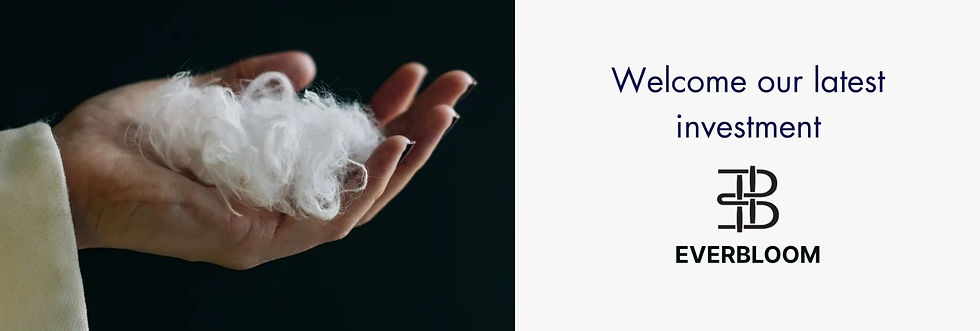Why We Invested in Everbloom: Reinventing Textiles from Waste
- Nicolás Glikson
- Aug 20, 2025
- 3 min read
Fashion is one of the world’s dirtiest industries, driving up to 10% of global emissions. Polyester rules as the cheap, petroleum-based fibre, while “noble fibres” like silk and cashmere drive water waste, land degradation, and animal exploitation. To decarbonise, fashion needs fibres that are cheaper, better, and cleaner; not just greener.
That’s why we backed Bloom Labs (now Everbloom) in their 2024 pre-seed. From day one, they weren’t just a “sustainable materials” play. They were rewriting textile manufacturing - turning organic protein waste into fibres that rival, and often outperform, silk, cashmere, wool, and polyester.
Based in New York, USA, Everbloom has since smashed technical milestones, landed partnerships with leading global fashion brands and heritage mills, and made it a no-brainer for us to double down in their seed round.

The Endgame: Transforming Fashion’s Material Base
Textiles are a 100-million-ton per year industry. Everbloom’s platform doesn’t just solve their beachhead market’s (cashmere and merino wool) sustainability problem - it’s a scalable pathway to replace the largest-volume fibres in fashion.
Now: targeting premium fibres like merino and cashmere with heritage Italian mills and global luxury brands.
Next: scaling to replace polyester - the world’s most used textile fibre and a major source of emissions and microplastic pollution.
The impact is massive: even partial replacement of silk, wool, and polyester translates into hundreds of megatons of avoided CO2e, plus huge cuts in water, land, and chemical use.
Reinventing the Rules of Fibre Production
Most next-gen material startups fail because they’re too expensive, need new infrastructure, or can’t meet brand standards. Everbloom cracked the code:
Scalable: fibres run on existing melt-extrusion and spinning machines—no retooling required.
Superior: testing shows fibres that are softer, stronger, and more breathable than premium wool. It’s even machine washable.
Cost-advantaged: at scale, cheaper than silk, cashmere, wool, and recycled polyester—with strong margins.
This isn’t eco-luxury at a green premium. It’s climate-denier-proof: better performance, better economics, lower impact.
Alignment to Thesis
At Endgame, we back climate solutions that win on economics. Everbloom ticks every box.
🌍 Massive Impact: replacing incumbent fibres cuts emissions at scale. Their fibres are 4x lower GHG than wool and 3x lower than cashmere.
🧵 Technical Moat: patented process, proprietary waste-to-fibre platform, and world-class scientific team.
📈 Commercial Pull: paid pilots and contracts with leading global brands.
💶 Capital Efficiency: asset-light, outsourcing production while using existing infrastructure.
A Visionary Team
Everbloom is led by Sim Gulati, a third-generation textile entrepreneur who grew up in his family’s mills in India. Sim pairs deep industry knowledge with startup execution - and has built a team of scientists and fashion insiders from Lululemon, Kering, and Pangaia.
This is not a team chasing capsule collections. They’re aiming to sit at the core of both luxury and mass-market supply chains - making waste the new raw material of textiles.
Looking Ahead
In August 2025, Everbloom rebranded and closed an oversubscribed seed round with Hoxton Ventures, SOSV, Clocktower Ventures, Tuesday Capital, Sustainabelle Advisory Services, and others.
Press like Vogue rightly spotlighted their attack on cashmere’s sustainability crisis. But the bigger story - and why we’re following on - is their ability to reset fashion’s material base.
At Endgame Capital, we back climate tech that scales fast, outcompetes incumbents, and thrives without subsidies.
Everbloom isn’t just reinventing cashmere. They’re reinventing textiles. And that’s why we’re all in.






